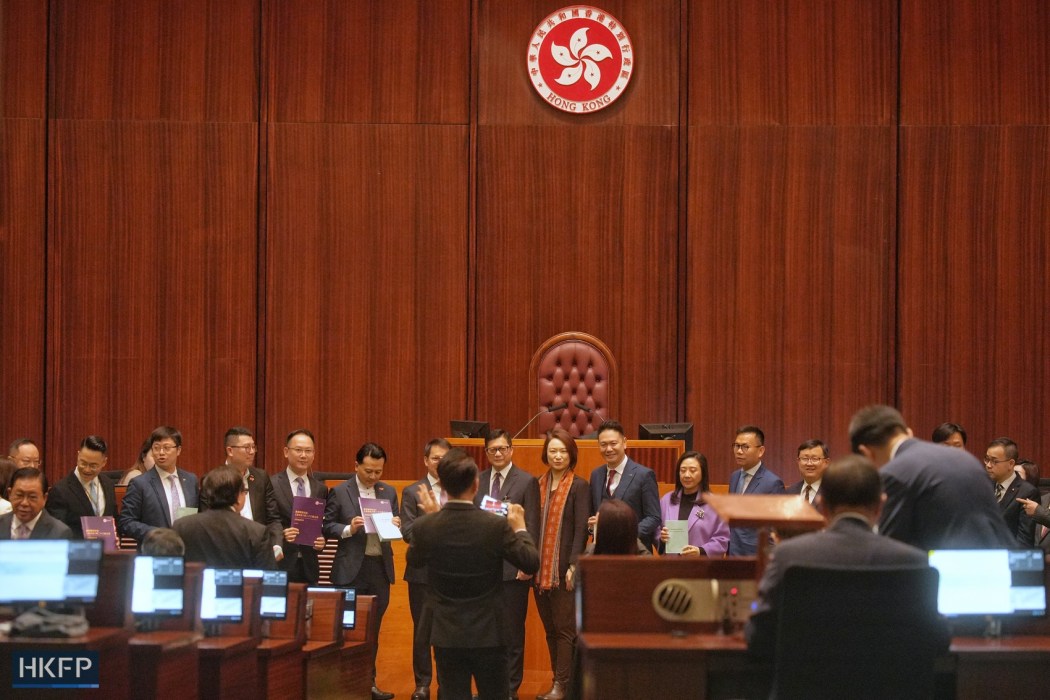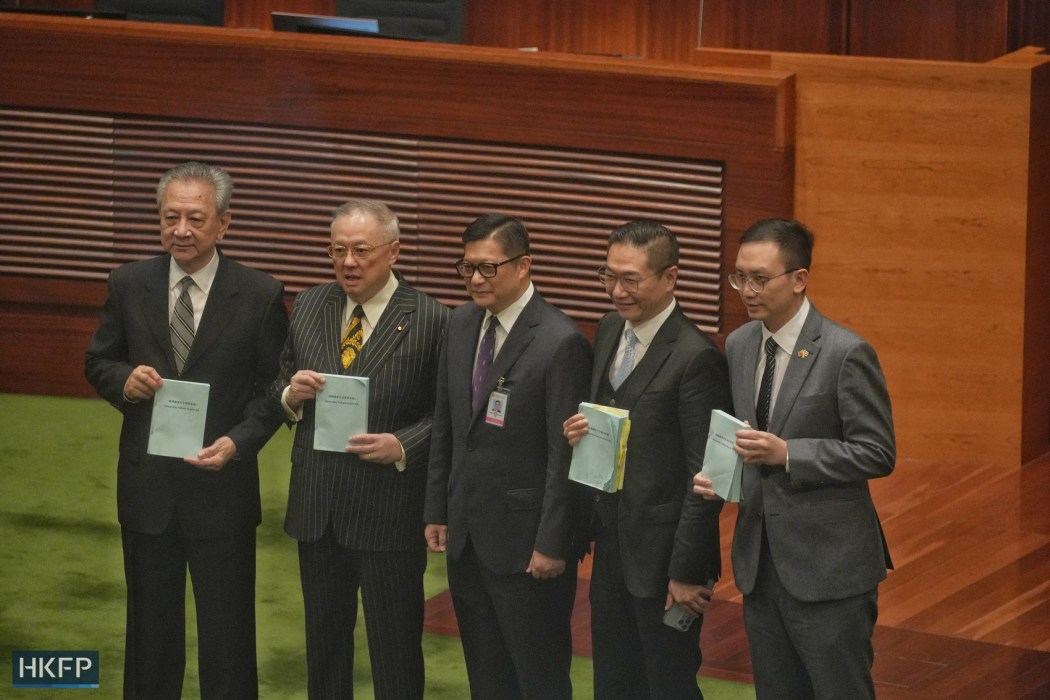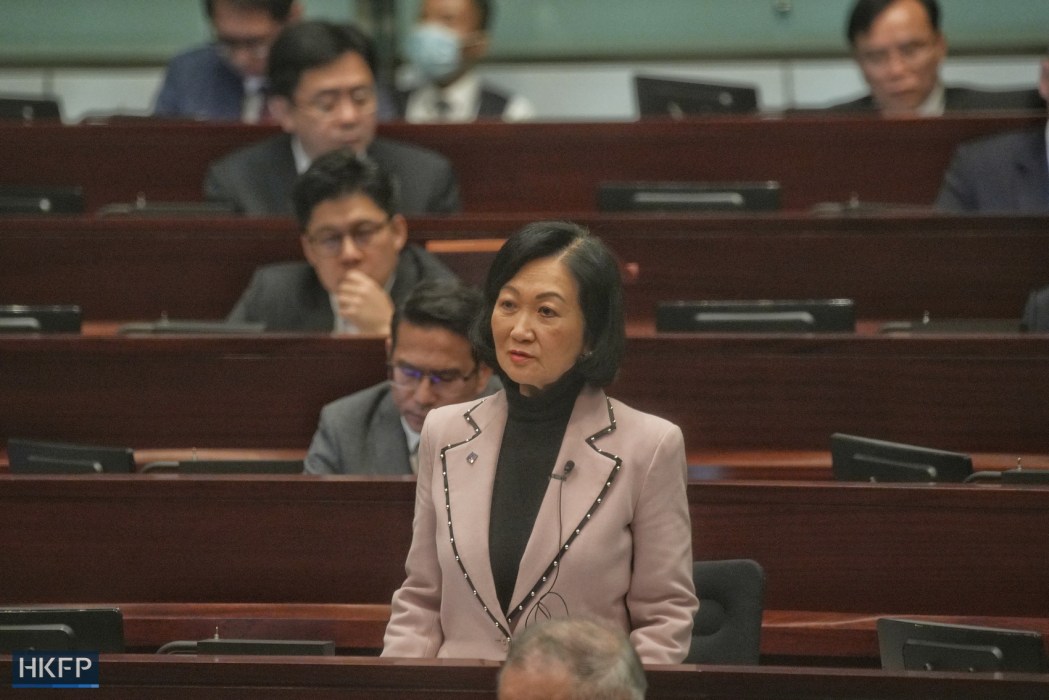Hong Kong’s opposition-free legislature is set to pass new security legislation, after the second reading of a proposed domestic security bill resumed earlier than expected.

Members of the “all-patriots” legislature threw their weight behind the Safeguarding National Security Bill on Tuesday, when the proposed legislation required under Article 23 of the Basic Law was tabled for final rounds of comments before it is expected to be passed later on Tuesday without opposition.
Article 23 of the Basic Law stipulates that the government shall enact laws on its own to prohibit acts that endanger national security, including treason and sedition. Its legislation failed in 2003 following mass protests and it remained taboo until after the onset of the separate, Beijing-imposed security law in 2020. Pro-democracy advocates fear it could have a negative effect on civil liberties but the authorities say there is a constitutional duty to ratify it.
More than two decades after the 2003 debacle, the government launched a four-week consultation exercise for the legislation in late January. The government hailed close to 99 per cent public support, but the 13,147 submissions collected represented only 15 per cent of the more than 90,000 views received during the same exercise in 2002.
The resumption of the second reading on Tuesday came a little over three weeks after the full text of the homegrown security law was revealed. The bill suggested imposing life imprisonment on four offences, limiting national security detainees’ access to lawyers and tightening measures against “absconders,” among other moves.
‘Historic milestone’
Gary Chan, chairman of the city’s largest pro-Beijing party DAB, hailed the bill as “accurately targeting” offences endangering national security. The proposed law had clear provisions and made reference to overseas laws, even the ones from countries that had “gossiped” about the Article 23 legislation, he said.

“[The Article 23 legislation] definitely would not affect law-abiding citizens and investors. It is also a law that is beneficial to consolidating Hong Kong’s status as an international financial hub,” he said in Cantonese.
The DAB chief went on to say that lawmakers had spent more than 40 hours scrutinising the bill and raised more than 1,000 “sharp and pragmatic” questions, which government officials had addressed in detail. The deliberation cleared doubts and rebutted “malicious slander and misunderstanding” on the legislation, he said.
Legislators were “honoured” to have participated in the enactment of Article 23 and the legislative work “can be finished soon,” he said.
“It has been 27 years and Hong Kong can finally fulfil its constitutional duty of safeguarding national security today. This is a historic milestone,” Chan said.

Another legislator Regina Ip, who was the city’s security minister during the earlier, failed attempt to enact legislation under Article 23, said many countries had broadened the scope of national security and updated relevant laws.
Such views echoed Chinese leader Xi Jinping’s speech in 2014, when he said safeguarding national security included protection economic and financial security, military security and ecological security, Ip, chairwoman of the New People’s Party said.
If Hong Kong had succeeded in passing the security law in 2003, the city would not have experienced the 79-day civil disobedience campaign known as the Umbrella Movement in 2014 or the protests and unrest in 2019, she added.
“I’m very glad that the law for safeguarding national security has reached this stage today. I hope we can complete this historic responsibility as soon as possible,” she said.
As of noon on Tuesday, around 50 of the city’s 89 legislators were waiting for their turn to make remarks on the bill before casting a vote on the motion for the second reading of the bill. If the motion is approved, the lawmakers will form a “Committee of the whole Council” to consider the proposed amendments and later move the bill for a third reading to complete the passage of the proposed law.
Beijing inserted national security legislation directly into Hong Kong’s mini-constitution in June 2020 following a year of pro-democracy protests and unrest. It criminalised subversion, secession, collusion with foreign forces and terrorist acts – broadly defined to include disruption to transport and other infrastructure. The move gave police sweeping new powers and led to hundreds of arrests amid new legal precedents, while dozens of civil society groups disappeared. The authorities say it restored stability and peace to the city, rejecting criticism from trade partners, the UN and NGOs.
Support HKFP | Policies & Ethics | Error/typo? | Contact Us | Newsletter | Transparency & Annual Report | Apps
Help safeguard press freedom & keep HKFP free for all readers by supporting our team

























